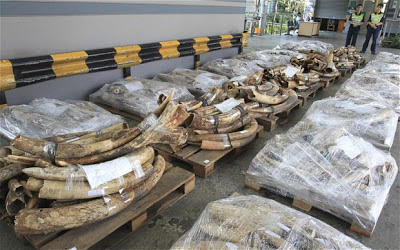Ivory from East Africa worth over £2 million seized in Hong Kong
Police in Hong Kong have made what has been described as one of the world's largest ever seizures of illegal ivory, uncovering two shipments from East Africa worth over £2 million.
Following a two-month investigation into the
booming illegal trade, customs officials said they pounced last week,
apprehending two shipping containers that had arrived at one of Hong
Kong's main ports from Kenya and Tanzania in East Africa.
Inside
the two shipments, which smugglers had attempted to disguise as
"plastic scrap" and beans, they found a total of 1,209 ivory tusks or
tusk fragments.
Customs officials said
the 3.8 ton haul would have been worth at least HK$26.7 million or
around £2.16 million on the black-market. Hong Kong's South China
Morning Post newspaper said 600 elephants would have likely been killed
to produce the massive shipment, which authorities described as the
largest ever ivory seizure in Hong Kong.
Lam
Tak-fai, the head of Hong Kong's Ports and Maritime Command, told
reporters the smuggling gang had tried to avoid detection by employing
unusual shipping routes.
One shipment
travelled on a vessel that left Kenya, passed through the United Arab
Emirates, Malaysia and Guangdong in mainland China, before finally
arriving in Hong Kong.
The other container left Tanzania and came to Hong Kong via Malaysia, he said.
Campaigners believe Hong Kong is now a major transit point for smuggled ivory and claim gangs ship their illegal cargoes through the former British colony's ports before moving them into carving factories in mainland China where they are turned into ornaments.
But Mr Lam, the customs official, described the seizure as "an isolated incident" and claimed the ivory was likely to have been distributed across Asia.
"We believe a small portion [of the tusks] would have gone to the mainland and the rest elsewhere in the region, such as Japan and Taiwan," he said on Saturday.
Seven alleged members of the smuggling ring were reportedly arrested in mainland China, shortly before the seizures last week.
Outrage over the mass slaughter African elephants led to a worldwide ban on the lucrative ivory trade in 1989, amid fears over the very survival of the species.
But demand for elephant tusks continues to boom in Asia, and particularly China, where ivory is seen as a symbol of wealth and is also used in traditional medicines. Heavily armed elephant poachers continue to operate in many Africa countries often, campaigners claim, at the behest of Asian criminal gangs.
A report issued earlier this year by the Convention on International Trade in Endangered Species of Wild Fauna and Flora (CITES) claimed levels of elephant poaching had reached their worst in a decade. The group said ivory seizures were at their highest levels since the international ban was introduced in 1989.
Source: The Telegraph
The other container left Tanzania and came to Hong Kong via Malaysia, he said.
Campaigners believe Hong Kong is now a major transit point for smuggled ivory and claim gangs ship their illegal cargoes through the former British colony's ports before moving them into carving factories in mainland China where they are turned into ornaments.
But Mr Lam, the customs official, described the seizure as "an isolated incident" and claimed the ivory was likely to have been distributed across Asia.
"We believe a small portion [of the tusks] would have gone to the mainland and the rest elsewhere in the region, such as Japan and Taiwan," he said on Saturday.
Seven alleged members of the smuggling ring were reportedly arrested in mainland China, shortly before the seizures last week.
Outrage over the mass slaughter African elephants led to a worldwide ban on the lucrative ivory trade in 1989, amid fears over the very survival of the species.
But demand for elephant tusks continues to boom in Asia, and particularly China, where ivory is seen as a symbol of wealth and is also used in traditional medicines. Heavily armed elephant poachers continue to operate in many Africa countries often, campaigners claim, at the behest of Asian criminal gangs.
A report issued earlier this year by the Convention on International Trade in Endangered Species of Wild Fauna and Flora (CITES) claimed levels of elephant poaching had reached their worst in a decade. The group said ivory seizures were at their highest levels since the international ban was introduced in 1989.
Source: The Telegraph




Comments
Post a Comment